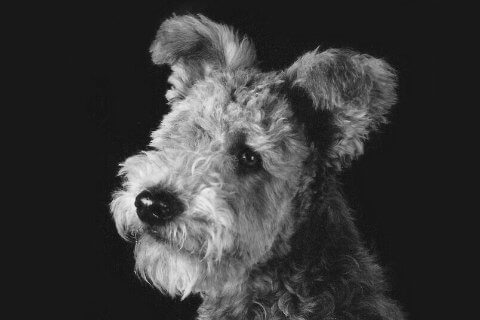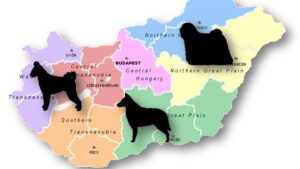
Judging the Pumi
Explore the Pumi, a Hungarian herding breed known for its unique coat, lively movement, and strong bond with its owner.
Home » Meet The Breeds » Pumi Dog Breed
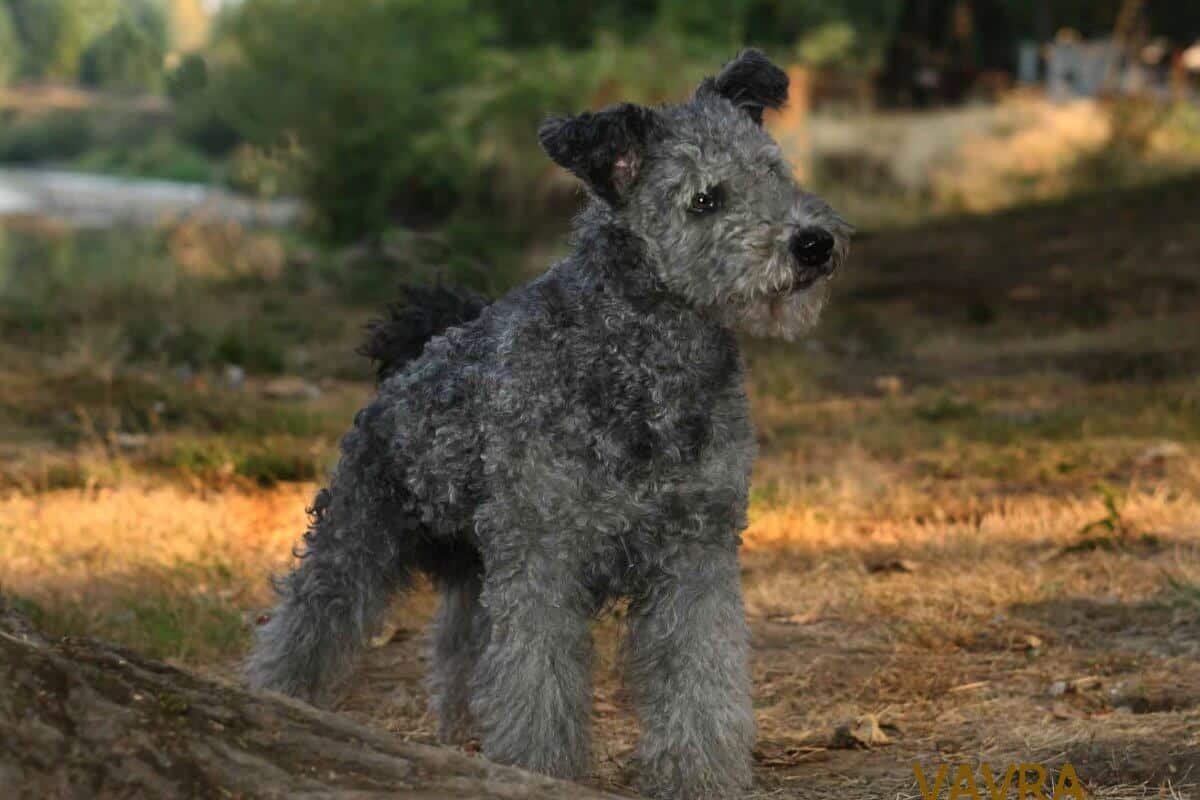

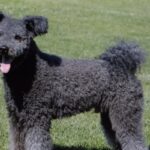


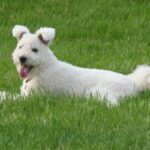
The Pumi (pronounced “poomie”) is a versatile and energetic purebred, renowned for its intelligence and playful demeanor. Originating in Hungary, this active and alluring breed is a herding dog at heart, showcasing a remarkable ability to control livestock with precision and agility. With its unique appearance, characterized by a curly coat and expressive, alert facial features, the Pumi has the ability to captivate the hearts of working dog enthusiasts and pet owners alike. Its medium-sized frame is complemented by a spirited personality, making the Pumi an excellent companion for active individuals and families.
Herding
15 – 18.5 Inches
22 – 29 Pounds
12 – 13 Years
| Country of Origin | Hungary |
|---|---|
| Bred For | Livestock Herding, Companionship |
| Known For | Corkscrew-Curled Coat, Intelligence, Versatility |
| Popularity | Low |
| Temperament | Energetic, Lively, Ready to Work |
| Activities | Herding, Running, Hiking, Conformation Shows, Dog Sports |
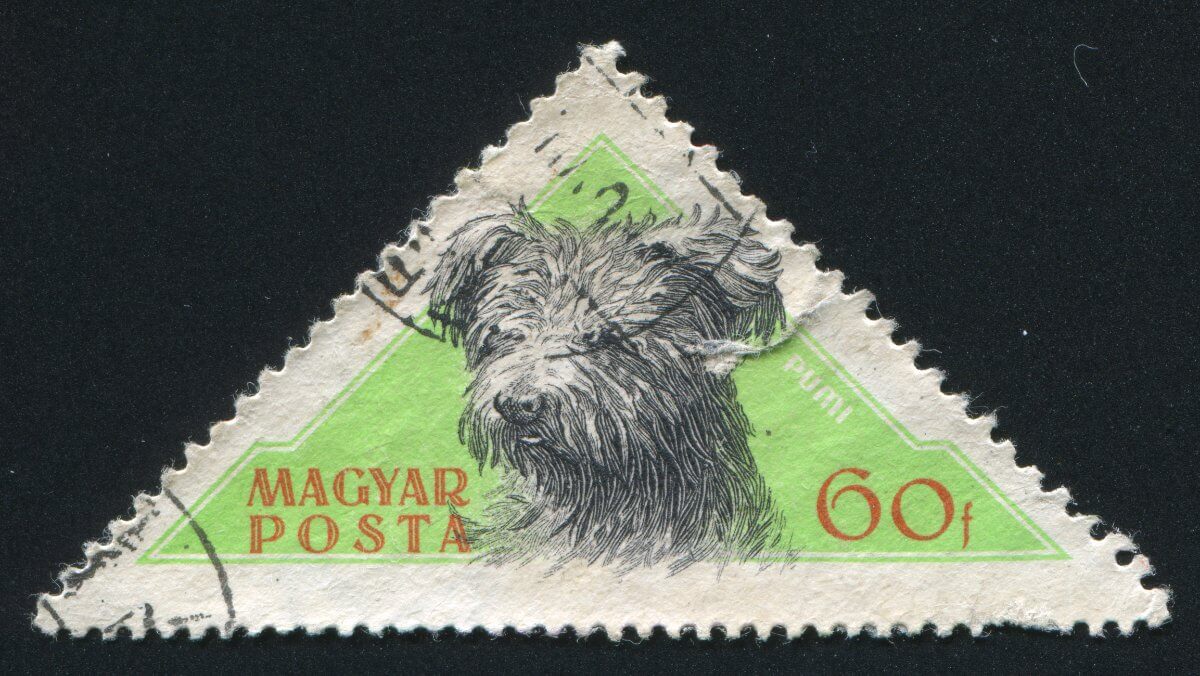
The Pumi originated in Hungary where it was primarily used for herding cattle and sheep. The breed is believed to have descended from ancient herding dogs brought to Hungary by migrating peoples, and later crossed with French and German herding breeds. The Pumi has been an integral part of Hungarian agricultural communities for centuries, valued for its excellent herding abilities, its incredible agility, and its extraordinary intelligence.
The breed has played a significant role in the lives of local farmers, helping to drive and manage a variety of livestock throughout the year. The Pumi’s keen intelligence, energetic disposition, and alert nature made for a reliable working companion. It was the dogs’ ability to herd and guard livestock, as well as keep vermin at bay, that made them so indispensable.
The Pumi was first recognized in Hungary in the early 20th century, and a Breed Standard was established to solidify the breed’s status as a distinct purebred. The American Kennel Club (AKC) officially recognized the Pumi in 2016, placing it in its Herding Group. Additionally, the breed is recognized by the Fédération Cynologique Internationale (FCI) and The Royal Kennel Club (UK), further establishing support internationally.
The breed’s popularity has grown steadily, particularly in Europe and North America where it has found success not only as a herding dog but also in various dog sports and as a beloved companion. Its playful and affectionate nature, combined with its intelligence and exceptional work ethic, make it a popular choice for farming families and individuals alike.
Today, the Pumi continues to captivate hearts with its charming personality, distinctive appearance, and versatile capabilities. While it remains a somewhat rare breed, its unique characteristics and suitability for various canine activities have allowed it hold a special position in the world of purebred dogs. The Pumi stands as a testament to the enduring bond between humans and dogs, showcasing the incredible versatility and companionship that our canine friends always provide.
The adult male Pumi typically stands at a height ranging from 16 to 18.5 inches at the shoulder, with the adult female being slightly shorter, standing at 15 to 17.5 inches.
In terms of weight, a healthy male Pumi generally weighs between 27 and 29 pounds; a female typically weighs in the range of 22 to 24 pounds.
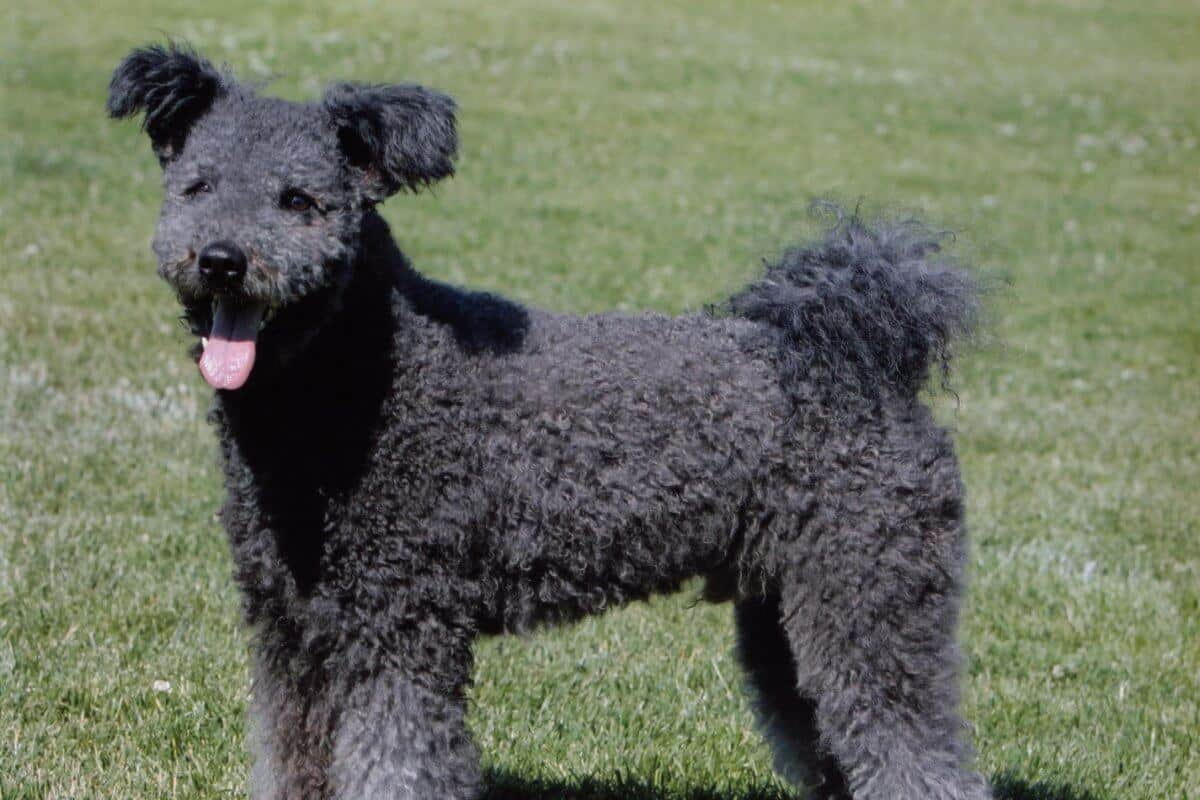
Pumik, the plural form of Pumi, exhibit a well-proportioned body, with a square build that reflects its strength and agility. The ratio of height at the withers to length of the body is 1:1, giving the breed a compact and robust appearance. This herding dog possesses substantial bone for its size, providing it with stability and endurance. The Pumi’s substance is balanced, appearing neither too light nor too heavy and allowing for optimal performance in various canine activities and work-related functions. These attributes are crucial for a breed with a heritage deeply rooted in managing and moving livestock.
Texture: The unique double coat of the Pumi consists of a harsh outer coat and a softer undercoat. A combination of wavy and curly hairs form corkscrew curls that stand out from the body at a length of 1.5 to 3 inches. The hair around the eyes and on the face is shorter, but the hair on the underside of the tail can reach a greater length. The coat should be allowed to dry naturally, and should never be fluffed-up or blown dry.
| Standard Color | |
|---|---|
| White | ee |
| Silver Gray | ee |
| Gray | ee |
| Black | ee |
| Fawn | ee |
| Born Gray | ee |
| Born Brown | ee |
A Note About Color: The Pumi is a solid-colored dog. Puppies are born black, but a “graying” gene causes the coat to lighten as it grows; however, an overall solid appearance should be seen on the adult dog.
| Standard Marking | |
|---|---|
| Black & Tan Markings | ee |
| Brindle Markings | ee |
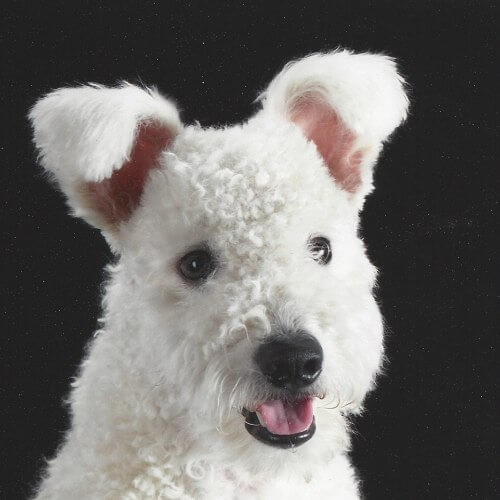
The tail of a Pumi is set high and carried over the back, creating a lively and spirited look. The tail forms a loop, with the tip touching the dog’s back and showcasing the breed’s alert and ready-to-act nature.
The tail is covered with curly hair, mirroring the texture of the coat on the rest of the body. This consistency of texture adds to the breed’s harmonious and well-balanced appearance. The hair on the tail, however, is slightly longer than that of the body, adding a touch of elegance and flair to the breed’s silhouette.
Pumik are not known to have bobtails; instead, they retain their tail’s full length, allowing for a natural beauty and a distinctive silhouette. The undocked tail speaks to the breed’s herding heritage, as a full tail aids in balance and agility while herding livestock over various terrain.
Owning a Pumi requires commitment as these dogs are very intelligent and need to be engaged in some form of work. Pumik flourish when given tasks to perform and require a considerable amount of exercise to satisfy their high energy levels. They form strong bonds with their families, making them exceptional companions; however, they do best in environments where they are included in daily activities.
Given their herding background, Pumik have a strong instinct to control and manage their environment, which necessitates consistent training and early socialization to foster well-behaved and balanced behavior. They can be wary of strangers, a trait that showcases their inherently protective nature and makes them excellent watchdogs. It’s important for potential caretakers of this breed to provide proper socialization from a young age to make sure the dogs develop well-rounded behavior around unfamiliar people and other animals.
Lifespan: Pumik are generally regarded as a healthy breed, having a lifespan that typically ranges from 12 to 13 years.
Despite the breed’s robustness, the Pumi can be susceptible to certain health conditions. Prospective Pumi owners should prioritize finding a reputable breeder who conducts comprehensive health clearances to verify the wellbeing of their breeding stock.
Pumik, can be susceptible to certain health conditions. Potential owners should be aware of these risks to ensure their Pumi receives the best possible care. Some health issues worthy of consideration include:
To maintain the health and well-being of a Pumi, regular veterinary visits are essential. These check-ups help in early detection of potential health issues and provide opportunities for socialization with new people and dogs alike. The health history of a puppy’s parents and other relatives should be shared to gain insight into any hereditary health issues that might be prevalent in the family.
The Pumi is known for its lively and energetic personality, making it a delight to have around. However, these dogs do require a specific kind of handling due to their unique personality traits. They tend to form strong bonds with their families, and while they are not the most novice-friendly breed, with the right training and socialization they can adapt well to various households. Their sensitivity level is moderately high, meaning they respond well to positive reinforcement and can be quite perceptive to the emotions of their human companions.
When it comes to being alone, Pumik can manage brief periods of solitude, but they prefer to be engaged in activities or to be in the company of their family members. They have a moderate tolerance for being left alone, and thrive best when they’re included in family activities.
Pumik generally get along well with other dogs, especially when they’re properly socialized from a young age. They can be a bit reserved or cautious around strangers, but they are not typically aggressive. However, proper introductions and positive experiences with new people can help to ease their wariness.
When it comes to young children, Pumik can be good companions, but interactions should always be supervised, especially if the children are not familiar with how to interact with dogs appropriately. Pumik are playful and enjoy engaging in games, but they also have a herding instinct. So, they may attempt to herd the children!
Providing proper nutrition is crucial for maintaining the health and vitality of Pumik. These energetic dogs require a balanced diet to support their active lifestyle. When it comes to feeding a Pumi puppy, it’s essential to choose a high-quality puppy food that supports their growth and development. Generally, a Pumi puppy should be fed three to four times a day.
As they mature into adults, the frequency of their meals can be reduced to twice a day. The amount of food a Pumi requires can vary based on their age, size, and activity level. On average, an adult Pumi may require between 1 to 1.5 cups of dry dog food per day. However, it’s vital to consult with a veterinarian to determine the appropriate portion sizes and to make sure that their nutritional needs are being met.
Pumik have a moderate tendency to gain weight, so it’s crucial to monitor their calorie consumption and weight level. Treats can be an important aid in training, but giving too many can cause obesity. Learning which human foods are safe for Pumik, as well as those that are not, is important. If you have any concerns about your dog’s weight or diet, it is advisable to check with your vet.
Fresh, clean water should be available at all times for your dog, helping it stay hydrated throughout the day. Regularly monitoring their diet, providing portion control, and making sure that they have access to clean water will contribute significantly to their overall well-being.
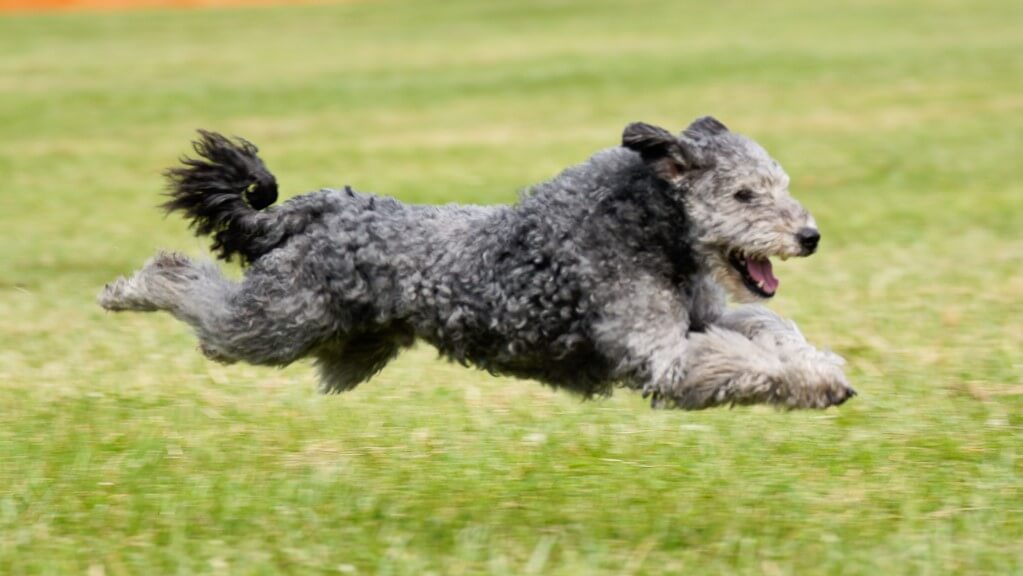
The Pumi is an intelligent and quick learner, which makes these dogs relatively easy to train. However, they do have a strong-willed and independent streak, meaning consistent and firm training is required. Using positive reinforcement techniques such as treats, praise, and play can yield excellent results. Due to their intelligence, they require mental stimulation to prevent boredom, which could lead to unwanted behavior.
While Pumik are not known for excessive barking, they will alert their owners to the presence of strangers or unusual situations. Early socialization and training can help to manage this tendency to bark. Furthermore, these dogs have a moderate degree of wanderlust. They can have the urge to explore if an interesting scent catches their attention, so secure fencing and obedience training are crucial.
The Pumi has a prey drive and may show a tendency to chase after small animals. Training can help to manage this behavior, and it is advisable to keep these dogs on a leash during walks in unsecured areas. They respond well to training that involves games and fun activities, which makes training sessions enjoyable for both the dog and the handler.
The Pumi possesses a high level of energy and requires regular exercise to maintain good health and happiness. These agile and lively dogs thrive on activities that engage both their minds and bodies, making them well-suited for active families and singles.
| Energy Level | High |
|---|---|
| Exercise Requirements | 2 Hours/Day (Minimum), Daily Walks, Vigorous Running, Regular Exercise, Playing with Another Dog, Mental Stimulation |
The Pumi’s energy levels are high, and these dogs require ample exercise to prevent boredom and potential behavioral issues. A combination of physical activity and mental stimulation is ideal for this breed. Activities such as running, playing fetch, and agility training can help to burn off any excess energy and keep the Pumi in good shape.
The intensity of the Pumi’s exercise regimen should be moderate-to-high, reflecting the breed’s energetic nature. These dogs enjoy being challenged and engaged, making activities that require them to think and move simultaneously particularly beneficial. Despite their small size, they have a lot of stamina and can participate easily in long play sessions.
Pumik also exhibit a playful demeanor, and they enjoy interactive games with their human companions. They can be quite playful, so providing them with a variety of toys and games can help to keep them entertained.
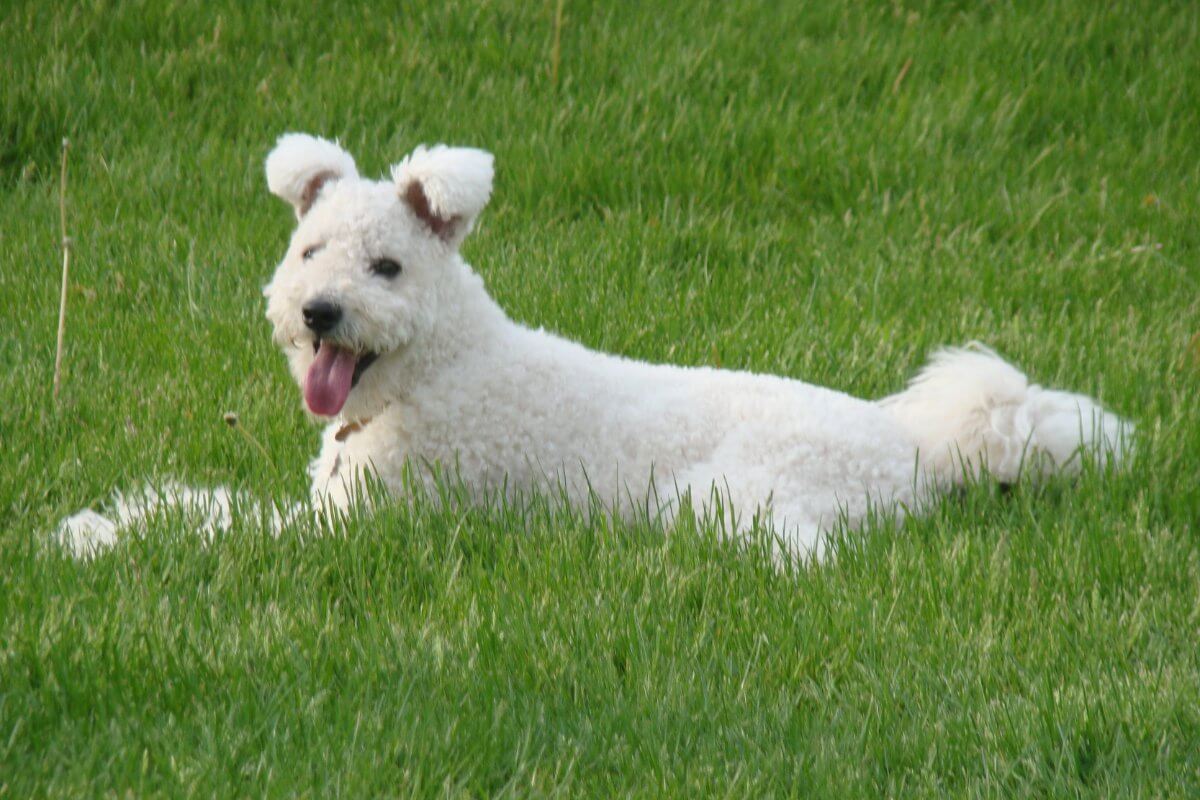
Grooming a Pumi requires a consistent routine to maintain the coat’s health and prevent matting. This breed possesses a curly, medium-length coat that is neither too coarse nor too soft, requiring regular brushing to keep it in good condition.
| Coat Type | Wavy to Curly, Combination of Harsh and Soft, Medium Length |
|---|---|
| Grooming Requirements | Weekly Inspection, Occasional Bathing & Scissoring, Routine Ear Cleaning, Periodic Nail Trimming, Regular Tooth Brushing |
Pumik do not shed excessively, but their curly hair can become tangled and matted if not properly cared for. Brushing the coat a few times a week can help to prevent mats and tangles, and it also helps to distribute natural oils throughout their coat, keeping it healthy and shiny. In addition to brushing, regular baths are needed to keep the coat in tip-top shape.
The Pumi’s grooming sessions also provide an excellent opportunity to check for any signs of skin issues and parasites. Paying attention to the Pumi’s ears, eyes, and teeth during grooming sessions is crucial, as these areas can be prone to infection if not properly maintained.
The Pumi can adapt to a variety of living situations, but there are several factors that potential caretakers should consider for providing a harmonious living environment. Since these energetic dogs are well-suited to active households, they like to be part of daily activities.
In terms of apartment living, Pumik can adapt well as long as their exercise needs are met. They are relatively small dogs, but their high energy levels mean they require plenty of physical activity and mental stimulation. Providing them with enough exercise and activities to keep them engaged is crucial, regardless of the size of the living space.
Pumik have a decent tolerance of cold weather, thanks to their thick, curly coat. However, like all dogs, they should not be left outside in extreme weather conditions for extended periods. Providing them with appropriate shelter and warmth during colder months is essential.
On the other hand, Pumik have a moderate tolerance of hot weather. Caretakers should make sure the dogs have access to shade and fresh water during warmer weather and intense physical activity should be avoided.
The arrival of Pumi puppies is a delightful experience, one that is filled with joy and excitement. These lively and intelligent pups are always eager to learn and will bond closely with their human companions. From the moment they are born, they exhibit their breed’s curious and playful nature, eager to explore their surroundings and interact with their mother and siblings.
Caring for a Pumi puppy requires attention to the pup’s physical and developmental needs. Providing proper nutrition is paramount, as the little one will grow rapidly and require a balanced diet to support its development. It is crucial to provide a puppy-specific food early on that caters to the pup’s unique nutritional requirements.
Socialization plays a vital role in the development of a Pumi puppy too. Exposing the pup to various people, environments, and other animals helps to shape its behavior and temperament, helping to become well-rounded and adaptable as an adult. Positive interactions and the use of treats and praise can help to reinforce good behavior.
The Pumi puppy has bundles of energy and needs ample playtime and exercise to release it. However, it is important to remember that the pup’s bones and joints are still developing, so activities should be age-appropriate and not too strenuous. Interactive games and short, supervised play sessions are excellent ways to burn off energy while preventing injury.
Potty training and basic obedience training should start early. Pumik are intelligent and quick learners, but they also have an independent streak. Consistency, patience, and positive reinforcement are key in shaping a puppy’s behavior and making sure it grows up to become a well-behaved companion.
Regular veterinary check-ups are crucial during this developmental stage. They will ensure the puppy is growing correctly and they allow opportunities to address any potential health issues early on.
The Pumi is a highly energetic and intelligent dog that excels in various activities. The breed’s agility, stamina, and eagerness to learn can make these dogs fantastic candidates for competitive events, as well as enjoyable companions for active families. Below is a list of dog sports that are well-suited for this breed:
Engaging a Pumi in these and other activities provides not only physical exercise but also mental stimulation, helping a Pumi to release energy and find contentment. The versatility and enthusiasm of the breed make it a joy to work with in a wide variety of canine sports and doggy activities.
The Pumi is recognized by the world’s leading registries and kennel organizations, which categorize the breed into a specific Group based on its unique characteristics. This breed is recognized worldwide under the following Group designations:
| Organization | Group Designation |
|---|---|
| AKC (American Kennel Club) | Herding |
| UKC (United Kennel Club) | Herding Dog |
| CKC (Canadian Kennel Club) | Not Recognized |
| ANKC (Australian National Kennel Council) | Working Dogs |
| RKC (The Royal Kennel Club) | Pastoral |
| FCI (Fédération Cynologique Internationale) | Group 1: Sheepdogs and Cattledogs; Section 1: Sheepdog |
The ideal Pumi is described by a Breed Standard that is approved by each of the world’s leading registries and kennel organizations. The Breed Standards for this breed may be found in the following links:
| Organization | Breed Standard |
|---|---|
| American Kennel Club | AKC Pumi Breed Standard |
| United Kennel Club | UKC Pumi Breed Standard |
| Canadian Kennel Club | Not Recognized |
| Australian National Kennel Council | ANKC Pumi Breed Standard |
| The Royal Kennel Club | RKC Pumi Breed Standard |
| Fédération Cynologique Internationale | FCI Pumi Breed Standard |
The Pumi is supported by a variety of breed clubs and organizations that are dedicated to preserving its rich heritage, promoting responsible breeding practices ,and providing resources for owners of these energetic dogs. The clubs often host events and provide educational materials as they foster a community of enthusiasts devoted to this unique breed.
In the United States, the Pumi is represented by the Hungarian Pumi Club of America. This organization works diligently to uphold the breed’s written Standard, encourage responsible breeding practices, and provide support for Pumi owners across the country.
In the United Kingdom, the Pumi community is represented by the Hungarian Pumi Club UK. This club is dedicated to the promotion, welfare, and improvement of Pumik in the UK. Its members provide support to owners, breeders, and enthusiasts, host breed-specific events, and offer resources on the breed’s health, training, and general care.
It is important for Pumi owners and those who are interested in the breed to connect with these organizations, as their members can provide invaluable support and important information, as well as a dedicated community of like-minded individuals who care about the well-being of this Hungarian breed.
A Pumi can occasionally find itself in need of rescue and rehoming. In such cases, various volunteer groups are at-the-ready to step in to provide assistance for the dogs, ensuring they find their forever homes.
In the United States, the Hungarian Pumi Club of America plays a significant role in rescue efforts for Pumik. The club not only advocates for the breed, it also works diligently to assist any Pumi in need. Its volunteers help to connect rescued Pumik with potential adopters and to provide resources that support successful transitions.
In the United Kingdom, the Hungarian Pumi Club UK can be a valuable resource for individuals looking to adopt a Pumi. The club’s members can provide guidance, support, and potential help for connecting adopters with Pumik in need of a new home.
Additionally, there is a wide range of herding breed rescue groups and all-breed rescues that could have a Pumi that is looking for a new home. Prospective owners are encouraged to reach out to these organizations to learn more about the specific dog that needs fostering or adoption.
The Pumi has a curly and dense coat that requires regular grooming to maintain its texture and prevent matting. While these dogs do shed, the amount of loose hair is considerably less than that many other breeds, thanks to the breed’s unique coat characteristics. Shed hairs tend to get caught in the curly coat, necessitating regular brushing to remove them.
No dog breed is completely hypoallergenic, but the Pumi is considered to be a better option for individuals with allergies. The breed’s curly coat produces less dander than breeds with straight hair, and this can contribute to fewer allergic reactions. However, to be sure a person with allergies can tolerate the breed, it is crucial to spend time around Pumik before deciding to bring one into the home.
The Pumi is considered a rare breed, especially outside its native Hungary. While the breed’s popularity has been growing, particularly since its recognition by the American Kennel Club in 2016, it is still a breed that is not commonly encountered. The rarity of the Pumi contributes to the uniqueness of owning one, but it also means potential caretakers may have to search longer to find a reputable breeder.
Pumik are known for their energetic and playful nature, making them good companions for families with children. However, as with any dog, it is crucial to teach both the kids and the dog how to have respectful and safe interactions. Proper socialization and training can help with supporting a positive relationship between a Pumi and its favorite children.
The Pumi is highly intelligent and a quick learner, which makes these dogs responsive to training and eager to please their human companions. Their intelligence, combined with their agility, makes them excellent participants in a variety canine sports and activities. However, their smarts can also mean they require mental stimulation to prevent boredom and promote good behavior.
Pumik have a vocal nature and are known to be quite expressive with their voice. They were bred as herding dogs, using their voice to control and direct livestock, so while their vocalizations can be managed with proper training, potential owners should be prepared for a dog that is inclined to express itself through barking.
The Pumi can make a wonderful family companion, bonding closely with its human family and thriving in a home environment. These dogs typically enjoy being involved in family activities and have a playful, affectionate nature. However, they do require consistent training, exercise, and mental stimulation to ensure they are well-behaved and happy members of the family.
Pumik have the intelligence and trainability that can make them suitable for certain types of service work. However, their small to medium size and their vocal nature may limit the types of service roles they can fill. As with any breed considered for life as a Service Dog, an individual’s temperament and the specific needs of the person requiring assistance are paramount in determining a dog’s suitability for the role.
The Pumi was primarily bred for herding rather than for hunting, so its natural instincts align more with controlling and moving livestock. While these dogs do have a keen sense of awareness and agility, they do not possess the typical traits sought after in a hunting dog. Therefore, they may not be the best choice for individuals looking for a companion in the field.
Pumik are social animals that form strong bonds with their families, and they thrive in environments where they are included in daily activities. Leaving a Pumi alone for extended periods can lead to boredom and potential behavioral issues. If an owner’s lifestyle requires leaving the dog alone for long periods, it’s essential to provide sufficient exercise and mental stimulation, and possibly arranging for a dog walker or pet sitter.
In terms of grooming, the Pumi requires regular maintenance to keep the curly coat in good condition. This includes regular brushing, to prevent matting, and occasional trimming. These dogs also have high energy levels and require ample exercise as well as mental stimulation. While they are not the highest maintenance breed, they certainly require a committed caretaker who can meet their grooming and activity needs.

Explore the Pumi, a Hungarian herding breed known for its unique coat, lively movement, and strong bond with its owner.
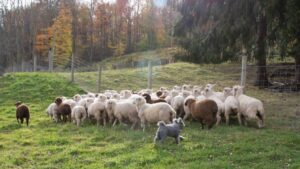
Pumik are whimsical, loyal, and hardworking, but their spirited, terrier-like personality requires dedicated attention and exercise.
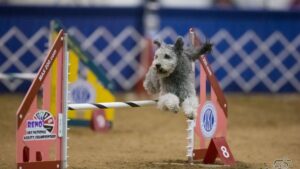
Life with three Pumis is a whirlwind of energy, loyalty, and joy, from morning chaos to evening cuddles – never a dull moment!
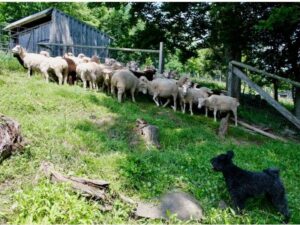
Discover the world of herding with Pumik: a unique journey into farming with Hungarian herding dogs. Explore their role on the farm and more!
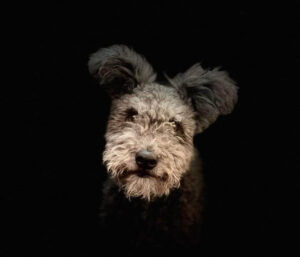
The muzzle, dark eye, black pigment and nose, and high-set, semi-erect ears covered with curly hair all contribute to the Pumi expression.
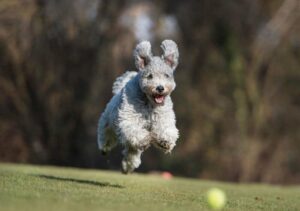
Pumi colors: Black, Gray, Silver Gray, White, Born Gray, Born Brown. Pumi markings: Brindle Marking, Black & Tan Markings. Learn more.
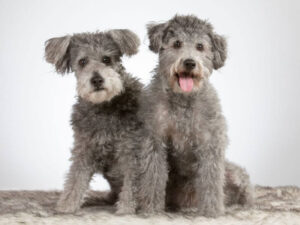
Key breed characteric of the Pumi is a coat with curly locks of hair. A blown dry coat can’t have the characteristic curls and locks of hair.

Explore the Pumi, a Hungarian herding breed known for its unique coat, lively movement, and strong bond with its owner.

Pumik are whimsical, loyal, and hardworking, but their spirited, terrier-like personality requires dedicated attention and exercise.

Life with three Pumis is a whirlwind of energy, loyalty, and joy, from morning chaos to evening cuddles – never a dull moment!

Discover the world of herding with Pumik: a unique journey into farming with Hungarian herding dogs. Explore their role on the farm and more!

The muzzle, dark eye, black pigment and nose, and high-set, semi-erect ears covered with curly hair all contribute to the Pumi expression.

Pumi colors: Black, Gray, Silver Gray, White, Born Gray, Born Brown. Pumi markings: Brindle Marking, Black & Tan Markings. Learn more.

Key breed characteric of the Pumi is a coat with curly locks of hair. A blown dry coat can’t have the characteristic curls and locks of hair.
The best way to ensure a long and happy relationship with a purebred dog is to purchase one from a responsible breeder. Not sure where to begin?
Contact the National Parent Club’s Breeder Referral Program, which is listed on the AKC Breeder Referral Contacts page.
